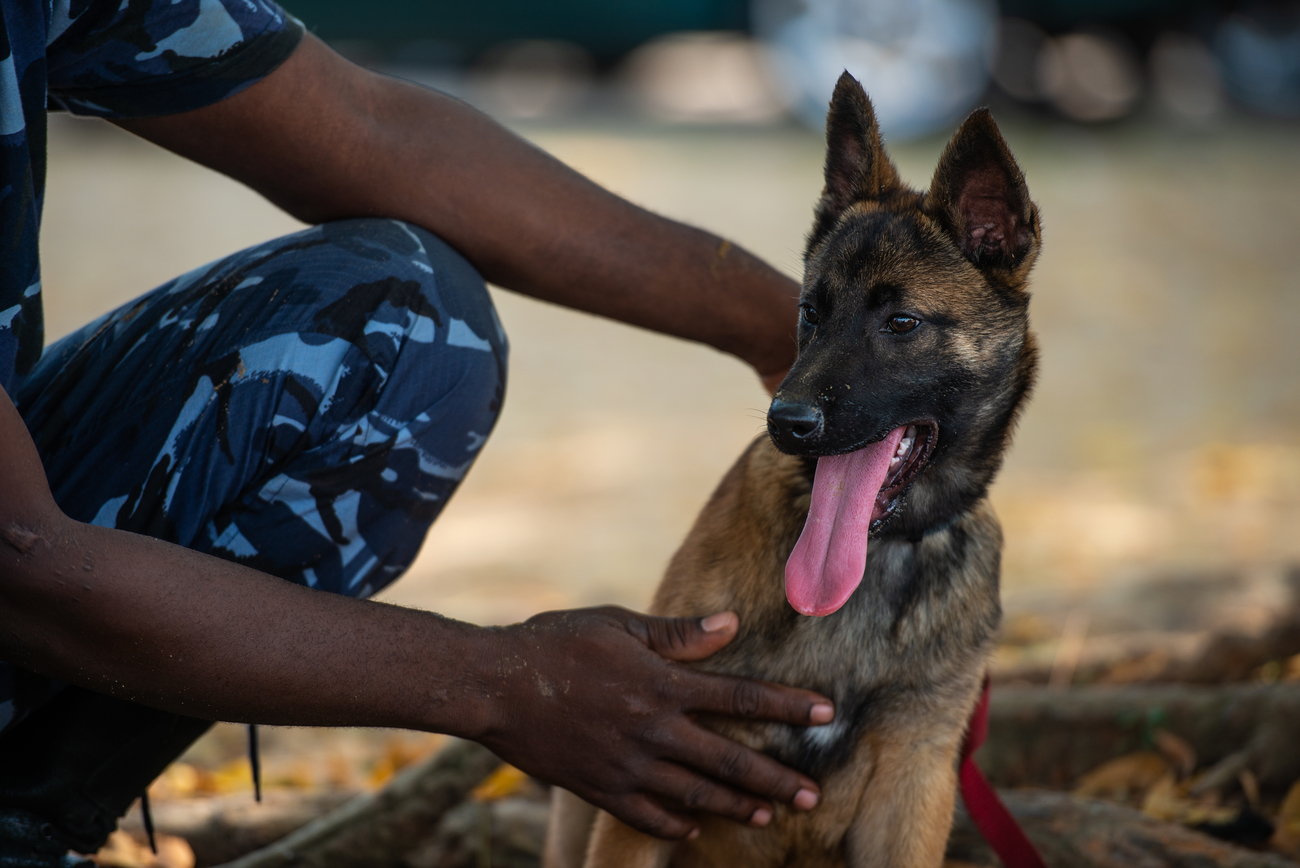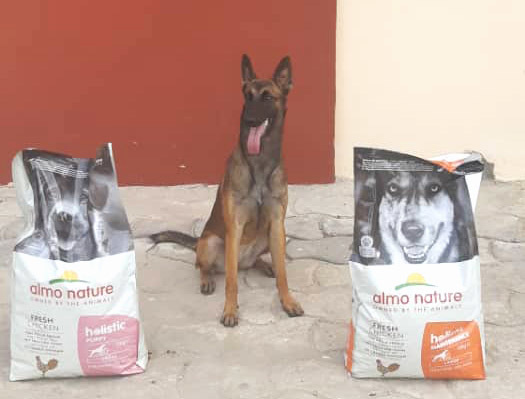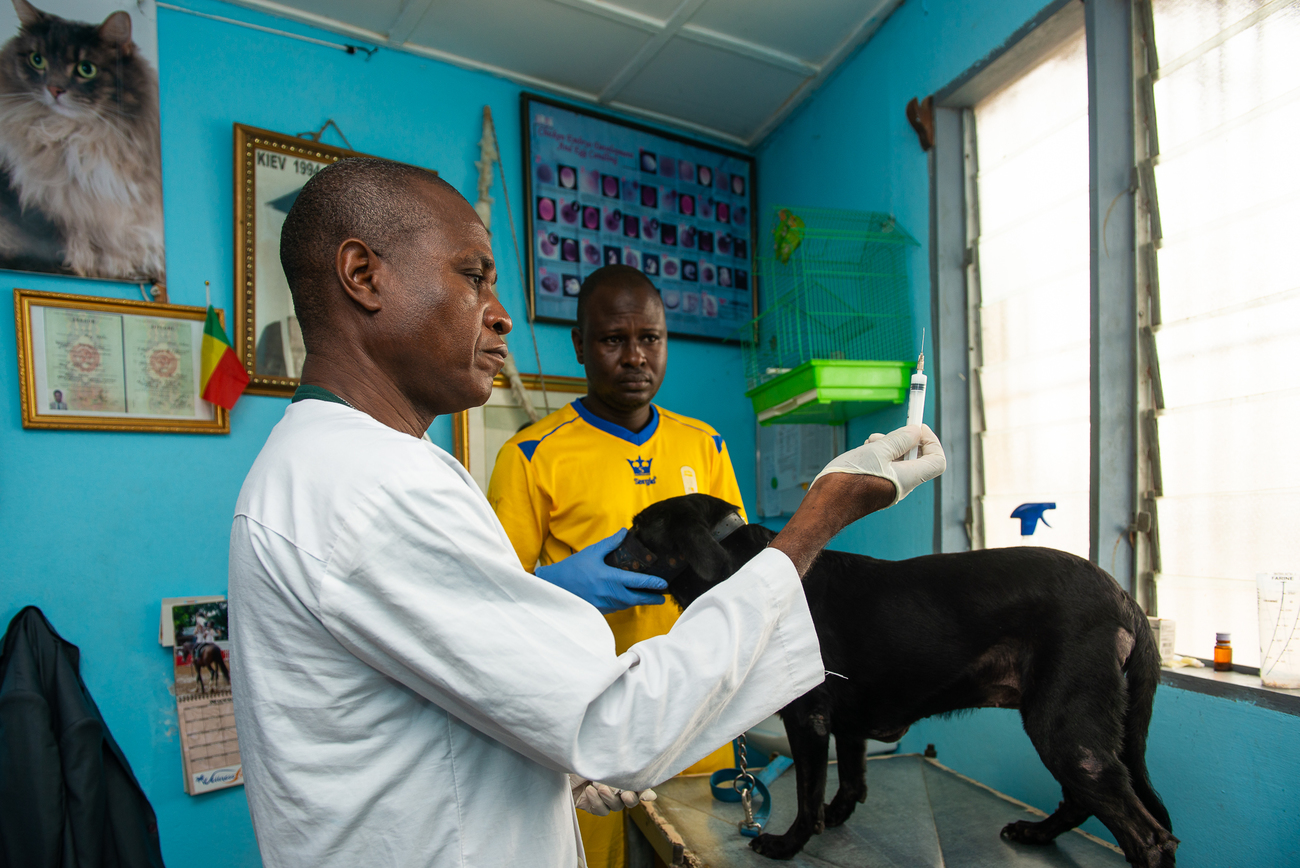Detection Dogs - Benin
Dogs can sniff out wildlife crimeproviding the highest quality of athletic care to our detection dogs
providing the highest quality of athletic care to our detection dogs

In Benin, law enforcement and customs officers work with detection dogs to sniff out explosives and drugs. To help protect wildlife, eight new dogs are being trained to also detect smuggled wildlife and wildlife products, such as elephant ivory and pangolin. IFAW has set up a training program to provide best practices for working with these dogs, and to ensure their health and well-being.
This starts with having the necessary infrastructures for the canine brigade in place, such as training areas, recreational spaces and proper housing that is tailored to the needs of these dogs. As Frederic Chappée, project lead for IFAW’s project in Benin, explains: “This past year, we have worked hard on rebuilding and adapting the structures, such as adding a separate space for the veterinarian team, while also setting up protocols to ensure these areas are kept clean.”
Just like any other dogs, working dogs also need proper nutrition. The food itself, however, is different because the activity level of working dogs is much greater than that of family dogs. It is therefore very important that the dog food is of really good quality, which is why IFAW is proud to partner with Almo Nature – a for-benefit company that produces high quality food for cats and dogs. Almo Nature's kibble food not only meets the dogs’ energy needs, but is also free of any animal flours, artificial flavors and preservatives. They cooperate with logistics partner DSV Group to transport the food to IFAW’s project site in Cotonou.

The partnership spans the length of the project, providing 600 grams of kibble per day, per dog. And what’s even better, it’s the kind of gift that keeps on giving as the generated profits of Almo Nature's pet food benefit animals and nature through a social-economic model with a single philanthropic purpose: protecting dogs, cats and biodiversity. “We made a radical choice and decided to serve a higher purpose: to help preserve nature and have a lasting, positive impact on its future. That is why all our sales profits are used to develop and support projects that are aiming to facilitate the peaceful coexistence between humans and wildlife. In this specific case, we have been given the opportunity to support dogs who are tasked with the protection of other animals. This is something we can only do because of the dogs and cats who choose to eat our pet food that's made with high-quality ingredients: a circular and regenerative approach that is made possible by partnering with IFAW,” says Pier Giovanni Capellino – Founder and president.
Another crucial part to the dogs’ welfare is monitoring their health. The vet team of the brigade, together with the handlers, have to closely monitor the dogs’ health and take all necessary measures to limit the risks of diseases. Part of this is implementing a healthcare plan, which involves grooming, vaccination, follow-ups and checks.
In this context, Ceva Santé Animale (Ceva), a French multinational veterinary pharmaceutical company, offers a range of pharmaceutical products and vaccines for animals. IFAW is grateful for the partnership with Ceva to improve the care and monitoring of the working dogs of the canine brigade in Cotonou. The company produces products that are adapted to the African region and the related health risks in Benin. For instance, the dogs are treated every month by applying a solution on their skin that protects them against the bites of external parasites such as fleas, ticks or mosquitoes.
“We are extremely proud to contribute to this great project where dogs and their human partners play a key role in protecting wildlife and biodiversity. These teams are doing an incredible job in a very challenging environment. The dogs are true athletes who deserve the very best veterinary care to protect their health and welfare. It's always rewarding when we see our products and services contributing in this way,” says Marie Varloud – Technical manager for parasiticides in companion animals.

By ensuring proper health management, keeping the detection dogs free of germs, parasites and protected by vaccinations, they are able to flourish and perform to the best of their abilities. But taking good care of these dogs of course goes beyond food and vaccines – their handlers take them on daily walks, groom them (hair, teeth, nails), and ensure that there’s ample room to play. And that playfulness is actually a key trait of dogs being trained as detection dogs. All these things combined provide the dogs with the tools they need to help achieve the ultimate goal of protecting wildlife.
Key within IFAW’s conservation efforts is animal welfare, which makes these partnerships highly appreciated in looking after the 4-legged athletes of the K9 brigade of Cotonou. As Céline Sissler-Bienvenu, director of IFAW France and Francophone Africa, states: “Our aim is to establish a West African centre of regional excellence for training conservation working dogs. To succeed we need dogs to be happy and in good health!”
Related content
Our work can’t get done without you. Please give what you can to help animals thrive.